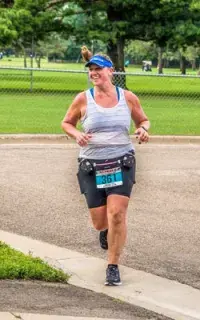
By donating a kidney to an anonymous pediatric patient, a lead TSA officer at Eastern Iowa Airport in Cedar Rapids selflessly offered a child hope for a normal life.
They’ve never met and don’t even know each other’s names, but Jill Hopper and the young kidney recipient are forever connected by a life-changing gift born from an entirely selfless act.
“They asked if I wanted to meet the recipient, and I said I didn’t care,” Hopper said. “I didn’t want it to be my choice. If you’re an organ recipient, that’s a lot to go through. I wanted it to be up to them.”
In March, the journey started when Hopper heard from someone on social media that their mother needed a kidney transplant. She began considering a donation, but she immediately learned the family was proceeding with another donor. “I thought, ‘Well, I was going to give it to her; why not give it to someone else?” Hopper said. “The timing was right.”
The process for a non-directed donation — one in which the donor is neither related to nor known by the person in need — is lengthy to ensure the potential donor is a good candidate both physically and mentally. Hopper passed all the screenings, and soon a match was found. The surgery was scheduled for July 22.
Hopper, who joined TSA in 2018, kept her supervisors updated throughout the process and said they were highly supportive, urging her to take the time she needed. A little-known federal law provided even more help.
The Organ Donor Leave Act of 1999 provides 30 days of paid leave to federal employees who serve as organ donors. That gave Hopper the time she needed to undergo surgery and fully recover without using her accrued sick time or annual leave. After six weeks, Hopper returned to work and was on light duty for two weeks. Now, she’s back to her regular duties.
“We knew from working with her that Jill truly cared about the passengers and co-workers she interacts with daily, but to give this gift to a stranger is amazing,” Iowa Federal Security Director John Bright said. “Her generosity is inspiring to the whole team.”
While she went through the experience, Hopper only disclosed to managers and human resources staff that she was donating an organ.
She said today, when people call her a hero, it feels weird. But she also wants to share her story more widely now to inspire others, especially federal employees who could use the same benefits from the Organ Donor Leave Act she did.
“I feel healthier, not just physically, but emotionally and spiritually,” said Hopper, who completed two half-marathons since her surgery. “I know I did something that will give someone else a longer, healthier life.”
By Jessica Mayle, TSA Strategic Communications & Public Affairs

